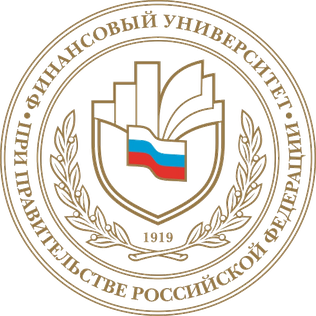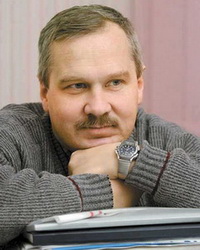
Kamer Daron Acemoğlu is a Turkish American economist of Armenian descent who has taught at the Massachusetts Institute of Technology since 1993, where he is currently the Elizabeth and James Killian Professor of Economics. He received the John Bates Clark Medal in 2005, and was named an Institute Professor at MIT in 2019.

Vladimer Papava is an Academician-Secretary of the Georgian National Academy of Sciences, a professor of economics at the Ivane Javakhishvili Tbilisi State University, the former Rector of the Ivane Javakhishvili Tbilisi State University, and the former Minister of Economy of Georgia.

Fabrizio Zilibotti is an Italian economist. He is the Tuntex Professor of International and Development Economics at Yale University. Zilibotti was previously professor of economics at University College London, the University of Zürich, and at the Institute for International Economic Studies in Stockholm.

HSE University, officially the National Research University Higher School of Economics is a public research university founded in 1992 and headquartered in Moscow, Russia. Along with its main campus located in the capital, the university maintains three other regional campuses in Nizhny Novgorod, Perm and Saint Petersburg. There is also the Lyceum at HSE University in Moscow.
Carlos Alfredo Rodríguez is an Argentine international academic and economist member of Chicago school. He took part in Javier Milei's presidential campaign in 2023.
Simon H. Johnson is a British American economist. He is the Ronald A. Kurtz Professor of Entrepreneurship at the MIT Sloan School of Management and a senior fellow at the Peterson Institute for International Economics. He has held a wide variety of academic and policy-related positions, including professor of economics at Duke University's Fuqua School of Business. From March 2007 through the end of August 2008, he was Chief Economist of the International Monetary Fund.

Financial University under the Government of the Russian Federation is a public university located in Moscow, Russia. It was considered among top five universities in Russia in 2010 according to Forbes and RBC as well as one of the oldest Russian universities preparing economists, financiers, philosophers, bankers and financial lawyers.

Yevgeny Grigoryevich Yasin was a Russian economist. He served as the economy minister of Russia from 1994 to 1997. Until July 2021, he was an academic supervisor at the National Research University Higher School of Economics. He was a regular contributor to the Echo of Moscow radio station.

New Economic School (NES) is a private institution of higher learning offering undergraduate and graduate programs in economics and finance in Moscow, Russia.

Sergey Maratovich Guriyev is a Russian economist, who is the dean and a professor of economics at the London Business School. Prior to which he as the provost of the Institut d’études politiques in Paris. From 2016 to 2019, he was the chief economist at the European Bank for Reconstruction and Development. He was a Morgan Stanley Professor of Economics and a rector at Moscow’s New Economic School (NES) until he resigned on 30 April 2013 and fled to France. In January 2024, he was announced as the incoming Dean of London Business School, succeeding François Ortalo-Magné.

Why Nations Fail: The Origins of Power, Prosperity, and Poverty, first published in 2012, is a book by economists Daron Acemoglu and James A. Robinson. The book applies insights from institutional economics, development economics, and economic history to understand why nations develop differently, with some succeeding in the accumulation of power and prosperity and others failing, according to a wide range of historical case studies.

Igor Yegorov is a Ukrainian economist, Sc.D. in Economics, Deputy Director of the Institute for Economics and Forecasting of the National Academy of Sciences of Ukraine, and Professor at the Faculty of Economics at the Taras Shevchenko National University of Kyiv. Until 2013 he was the Head of Department for Systemic Studies of S&T Potential at G.M. Dobrov Center for Scientific and Technological Potential and Science History Studies of the NAS of Ukraine. He is a member of the Academic Council of Scientific and Technical Complex for Statistical Research of the State Statistics Service of Ukraine.

Edward Martini Sandoyan, is a doctor of Economic Sciences of Armenia and the Russian Federation, professor, and served as Minister of Finance & Economy of Armenia from 1998 to 1999. The rector of Russian-Armenian University since June 2023.

James Alan Robinson is a British economist and political scientist. He is currently the Reverend Dr. Richard L. Pearson Professor of Global Conflict Studies and University Professor at the Harris School of Public Policy, University of Chicago. He also serves as the Institute Director of The Pearson Institute for the Study and Resolution of Global Conflicts at the Harris School. Robinson has previously taught at Harvard University between 2004 and 2015 and also at the University of California, Berkeley, University of Southern California and the University of Melbourne.
William R. Kerr is the Dimitri V. D'Arbeloff – MBA Class of 1955 Professor of Business Administration professor at Harvard Business School, where he is a co-director of Harvard's Managing the Future of Work project and faculty chair of the Launching New Ventures program for executive education.

Daniel Diermeier is a political scientist and university administrator. He is serving as the ninth chancellor of Vanderbilt University. Previously, Diermeier was the David Lee Shillinglaw Distinguished Service Professor at the University of Chicago, where he also served as provost.

Andrew John Scott is a British economist, currently Professor of Economics at London Business School, known for his work on longevity and macroeconomics. Previously he was a lecturer at Oxford University, a visiting professor at Harvard University and a researcher at the London School of Economics.

The Center for Strategic Research, or CSR, is a Russian public policy think tank based in Moscow, Russia. The Center for Strategic Research (CSR) is a non-commercial organization that plays key role in elaboration and implementation of long-term development strategy of Russia's economy. CSR was established in December 1999.

Ufuk Akcigit is a Turkish economist. In 2020 he was named the Arnold C. Harberger Professor of Economics at the University of Chicago, the Kenneth C. Griffin Department of Economics. His research concentrates on economic growth and development, and uses an interdisciplinary approach blending micro and macro economic concepts to examine the intersection of policy and innovation.
Persistence studies is scholarship in the social sciences that links, usually through quantitative causal inference, historical events with later political, economic and social outcomes. It is particularly prevalent in economics, economic history, political science, and sociology. The scholarship emerged in the early 2000s. Early landmark studies include two studies by economists Daron Acemoglu, Simon Johnson, and James Robinson in 2001 and 2002 that linked colonial institutions to variations in contemporary economic outcomes.
















